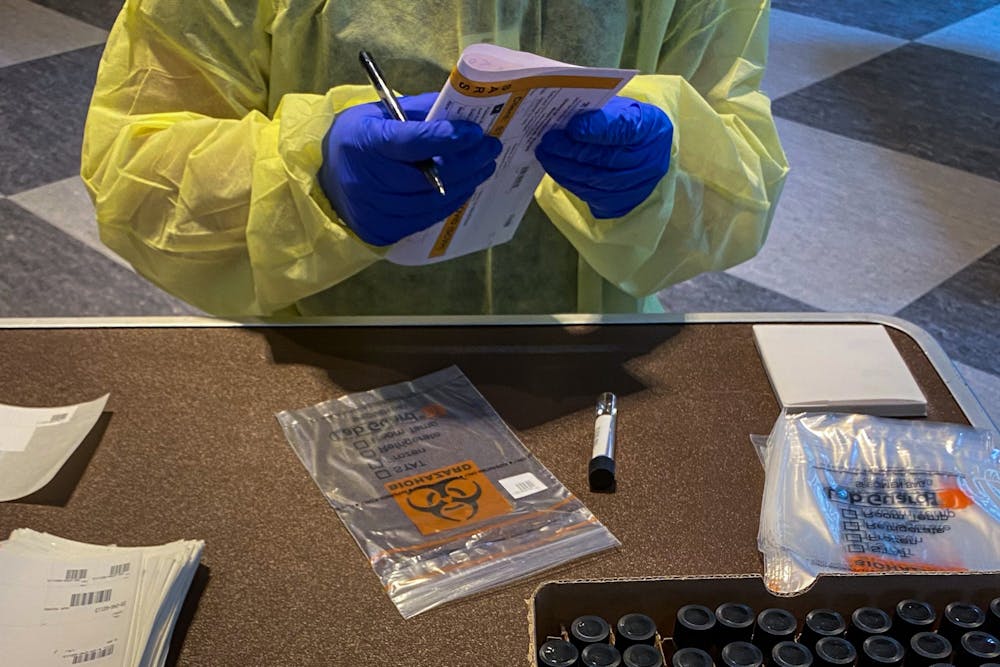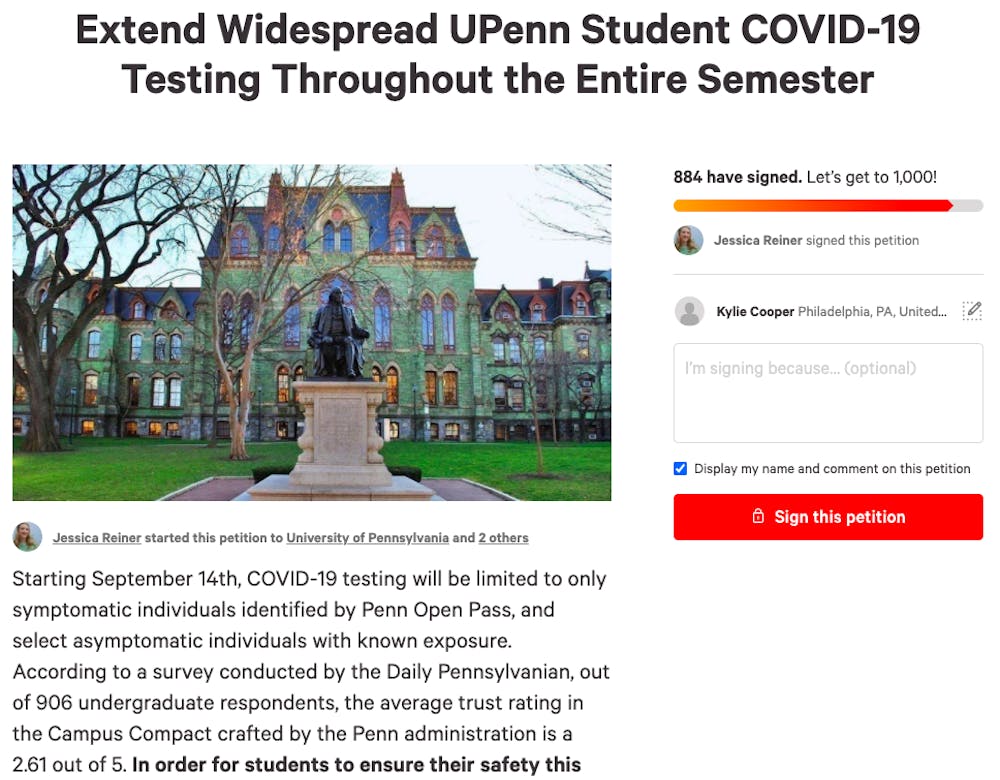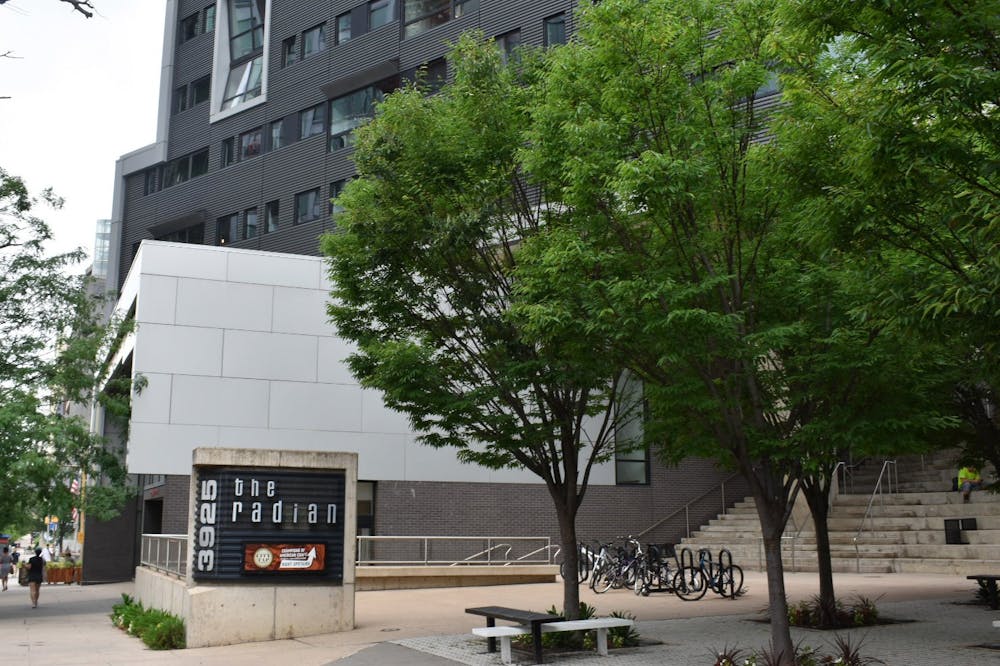
Penn will no longer offer COVID-19 testing for all asymptomatic individuals beginning Sept. 14, but many students are calling on the University to continue to provide testing for all students for the entire semester.
Penn is currently offering free COVID-19 tests in Houston Hall for students living on or off campus, regardless of whether they are symptomatic. Starting on Sept. 14, the University will switch to a “symptomatic and surveillance testing” protocol, where testing will only be available to students who are either symptomatic or considered to be at a “greater risk of carrying the disease,” Chief Wellness Officer Benoit Dubé wrote in an email to The Daily Pennsylvanian.
"While we are very fortunate to be able to partner with Penn Medicine and benefit from its shared resources and expertise, we must also acknowledge that testing resources are precious and should be used and allocated judiciously as we tackle this public health crisis," Dubé wrote.
Dubé wrote that the University will invite specific asymptomatic members of the Penn community, including students, faculty, and staff who are deemed have a higher exposure risk, to enroll in surveillance testing protocols once Penn has finalized the details of the program.
Despite the University’s assurances that testing will continue for a select number of asymptomatic students in a higher risk category, many have expressed frustration that testing will no longer be available for all students. A petition to extend widespread COVID-19 testing throughout the entire semester has garnered over 800 signatures. An infectious disease specialist at Penn Med, however, says widespread asymptomatic testing could backfire and yield more false positives, skewing the accuracy of the overall results.

College senior Jessica Reiner, who started the petition on Aug. 31, said she is living in an off-campus apartment and felt compelled to speak out after learning of confirmed COVID-19 cases in the Radian, her apartment building. Reiner described it as hypocritical of Penn to give students the impression in June that it had the ability to test all 10,000 undergraduate students throughout the semester, and yet after Sept. 12, refuse to test the small subset of students who currently live off campus.
"In order for students to ensure their safety this semester students should be able to get tested, regardless of the reason, throughout the entire semester," the petition reads. "Extended testing will help reduce spreading, especially in the winter months, when people will be forced to put themselves in an uncomfortable position and take the risk of seeing others indoors if testing is not widely available."
In an academic theme year which Penn calls the Year of Civic Engagement, 2023 Class Board President and Wharton sophomore Derek Nhieu, who signed the petition, said that Penn should protect its students and the West Philadelphia community from COVID-19 by continuing free testing or subsidizing the cost.
“Students are guests of Philadelphia and the West Philadelphia community," he said. "As guests, our actions have an impact on the community of people who live and work here. Penn has that social responsibility to be like, students are coming back to this area because of us."
Vanderbilt University, which is operating under a hybrid model with a mix of in-person and online classes, requires its undergraduate population of more than 7,000 students to take weekly COVID-19 tests, regardless of whether they live on or off campus. Similar to Penn, Duke University and the University of Virginia operate under a "surveillance testing" model, where symptomatic and select asymptomatic students can access COVID-19 tests. The University of Virginia will allow asymptomatic individuals to voluntarily test for COVID-19 no more than once every 60 days.
Dubé described testing as a "piece of the puzzle," but emphasized that individual behaviors, such as wearing a mask, physically distancing, and washing hands are what keep the community safe.
Students’ demands for continued widespread testing are amplified by reports of off-campus parties that violate Penn’s Student Campus Compact. One social media account, @irresponsibleatpenn, has documented multiple off-campus gatherings where partygoers are not wearing masks or social distancing, alarming many students.
Contrary to the petition, Paul Axelsen, Penn Med professor of Pharmacology, Biochemistry, Biophysics, and Medicine in the Infectious Diseases program, said widespread asymptomatic testing would not be useful, as the disease prevalence of COVID-19 off-campus is very low and will lend itself to false positive test results.
According to Penn Wellness COVID-19 FAQ, Penn has currently tested 9,238 students since August 1, with a total positivity rate of 0.68%.
“If the background incidence [or prevalence] of disease is low, for most tests with a typical sensitivity and specificity, most positive [results] will be false positives,” Axelsen said. “We don't know what the background [disease prevalence] rate is, but we do think that it's fairly low, and at that level, you're bound to have more false data coming from your test than you are accurate data.”
A test's sensitivity refers to the true positive rate, while its specificity refers to its true negative rate, according to the U.S. Food and Drug Administration.
Axelsen said false positive tests would not only require people to quarantine unnecessarily, but also lead them to believe that they are immune to a virus they did not contract and give them a false sense of security.
“You're better off testing symptomatic people, and then going back and trying to trace their contacts over the past few days, and controlling the spread that way," he said. "If you have limited resources, that's by far and away the most cost effective and health policy effective way to control this."
The frequency of false positive test results has ignited a debate among scholars over the value of widespread asymptomatic testing. On Aug. 27, Centers for Disease Control and Prevention Director Robert R. Redfield issued a statement suggesting that close contacts of an infected person "do not necessarily need a test" if they are asymptomatic, sparking outrage among some experts in the field.
Associate Professor of Epidemiology in Biostatistics and Epidemiology Michael Levy fears off-campus apartment buildings could become hotspots for the virus, and that without adequate testing, cases could spread rapidly.
“If you're not testing, you can very quickly have a lot of spread without being aware of it and that's worrying from the point of understanding the epidemic in the city, in the University, and reacting to it,” Levy said.
Reiner said that when Penn announced that juniors and seniors were not guaranteed on-campus housing on June 25 and later decided to close on-campus housing for all students, students flocked to live in apartment buildings that resemble dormitories such as the Radian or Domus.

The Radian apartment complex's room layouts resemble student dormitories.
“When we’re all living in large, off-campus buildings like the Radian or Domus, it’s pretty much like a college dorm,” Reiner said. “It’s really concerning that [asymptomatic carriers] could be living in the same building as me, taking the same elevator, sharing the same lobby, and using the same amenities like the gym or common rooms.”
Of the 63 positive cases that have been identified at the Houston Hall testing site since Aug. 1, an unspecified number includes students living in the Radian, Campus Apartments, and University City Apartments — all of which sent emails last week to the properties' respective tenants about residents who tested positive for COVID-19.
In response to ongoing outbreaks at colleges and universities in Philadelphia, the Philadelphia Department of Health issued new guidelines on Aug. 29 recommending students avoid all social gatherings with people outside their households.
Axelsen said that students living off campus should show the same fervor for social distancing as they do for demanding more tests.
“Testing is the least important factor to control this pandemic. It's the social distancing that is going to be absolutely and ultimately only effective. Even contact tracing is only going to work if we've been socially distanced,” Axelsen said. “Testing is compensation for our failure to adequately socially distance.”
Some students believe that at the very least, Penn should provide all students a COVID-19 test before the start of Thanksgiving break, when some students will presumably travel home through public transportation and also potentially come into contact with relatives at higher risk of becoming severely ill from the virus.
Dubé wrote that Penn currently has no plans to test students before they travel home for Thanksgiving.
"Based on the current gateway testing positivity rate of less than one percent, there would not be a need to test students before they return home for Thanksgiving," he wrote. "This is a fluid situation and these plans may change."
Wharton sophomore Evan Light Rake, who signed the petition and is living off campus, said Penn has an obligation to continue widespread testing for off-campus students, who will inevitably socialize and contribute to the spread of the virus.
“We have a [14.7] billion dollar endowment. If there's any time to use the money, it’s now,” Light Rake said. “It’s Penn’s responsibility to ensure that all of their students are safe, regardless of where they are.”
The Daily Pennsylvanian is an independent, student-run newspaper. Please consider making a donation to support the coverage that shapes the University. Your generosity ensures a future of strong journalism at Penn.
Donate






